Hope for Syria
Joji Ikezu (Japanese Language Education Advisor, the Japan Foundation Cairo Office)
"For us, studying Japanese is an act of holding out hope for the future."
These were the words spoken by a young Japanese language teacher from Syria at the Japanese Language Education Seminar in the Middle East hosted by the Japan Foundation Cairo Office in August of this year.
The seminar is held annually with the participation of approximately 40 Japanese-language teachers from the Middle East and North Africa for training and information exchange. This year marked the 15th anniversary of the seminar. Forty teachers from seven countries participated, including two from Syria, a country that for several years now has been in the grips of civil war.
Over the past few years, revolutions, civil wars, and conflicts have frequently occurred in the Middle East, so it is becoming increasingly difficult to organize a joint training workshop attended by participants from such a broad region. There are various reasons for this. For some participants, it is hard to leave their own countries, and even if they manage to reach Cairo, there is the uncertainty over whether they will be able to return.
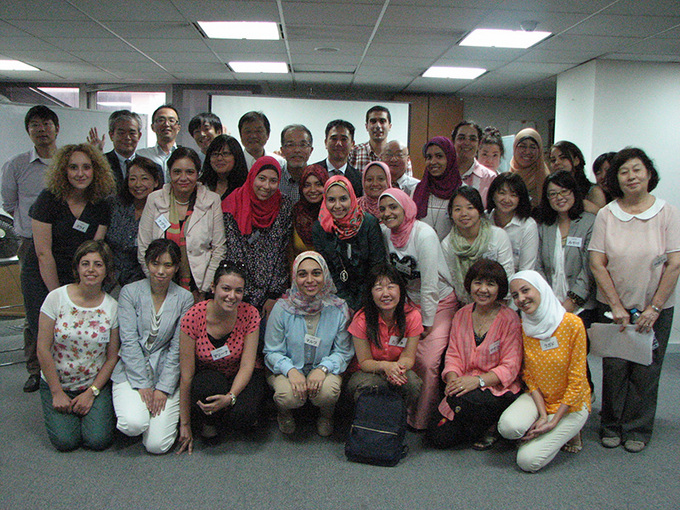
Group photograph of the participants in the Japanese Language Education Seminar in the Middle East
Participation realized after two long years
Participation from Syria was not easy either. Last year, the organizers got in touch with Syrian Japanese language teachers and started preparations at quite an early stage in order to ensure their participation in the seminar, but were faced with various difficulties. The teachers needed permission from their university to participate, and it was hard to obtain information on the documents necessary for visa application, so by the time the teachers were ready to apply for their visas it was already too late. They eventually gave up on participating in the seminar.
This year, the organizers got in touch with the potential participants and advanced preparations even before the precise schedule and content of the seminar were determined. As a rule, visa applications are not accepted earlier than one month prior to the scheduled trip. At that point, if any deficiencies are discovered in the documents, it is quite possible that the applicants will not manage to amend them in time. And even if application procedures are launched successfully, it remains unclear whether and when an entry permit will be granted. It was very hard to keep track of the progress of the applications, so the whole process was quite suspenseful.
Sometime in July, the Consular Section at Embassy of Egypt in Damascus received an authorization from the Egyptian Ministry of Foreign Affairs to issue the visas, and the Syrian teachers successfully received their entry permits. The next problem, however, was choosing via which country they should travel to Egypt. That is why when we heard that the two teachers had safely passed through passport control, we spontaneously make a fist in a sign of triumph.
Holding out hope for the future
Perhaps it is not easy for Japanese people to understand why these two teachers went to such lengths to participate in the seminar. At the group discussion conducted as part of the seminar, participants talked about the purpose and motivation of learners in their respective countries to begin studying Japanese. While most of the teachers mentioned the recent increase in the number of learners motivated by their interest in Japanese anime and manga, the two teachers from Syria had a different story to tell.
"In Japan, atomic bombs were dropped over Hiroshima and Nagasaki during World War II, burning everything to the ground. Yet, Hiroshima and Nagasaki were reborn as beautiful cities, and Japan became one of the world's most advanced nations. For us, Syrians, studying Japanese is an act of holding out hope for the future."
The two participants began teaching immediately after graduating from university. Although they lacked the required academic degree, theoretical knowledge of teaching methods, and experience, they were hired because of the grave deficiency of teachers. Both of them, however, have studied in Japan in the past and possess solid Japanese language proficiency. Above all, the teaching method they explained using a slide presentation was truly amazing.
The two decided that their ability to teach Japanese to the senior students in their department was limited, so they came up with the idea to initiate independent learning rather than simply teach. The young teachers assigned to their students various themes, which the students researched in Japanese on their own, using the Internet, and then presented their findings, also in Japanese. The young teachers called their approach a measure of last resort, but in fact it is an excellent teaching method applied by the best teachers in the world. Incidentally, this has also been adopted in the Japanese language courses at the Japan Foundation Cairo Office. This proves that the two young women are outstanding teachers with the capacity to come up with such an idea and actually apply it in practice.
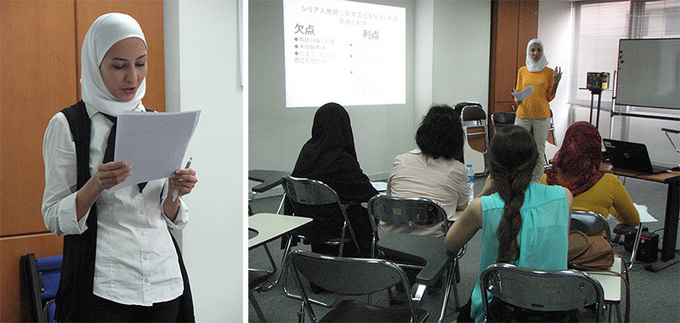
Left and right: Raghad, a Japanese language teacher from Syria, gives a presentation
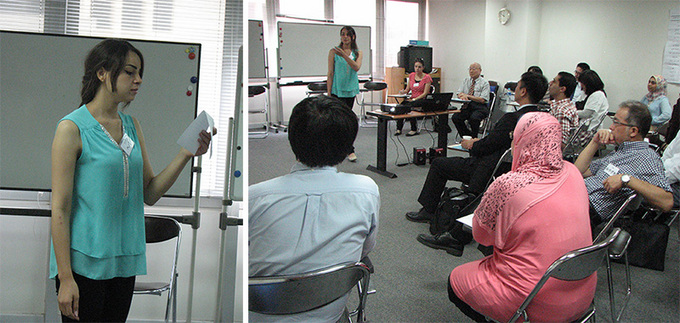
Left and right: Heba, another Japanese language teacher from Syria, gives a presentation
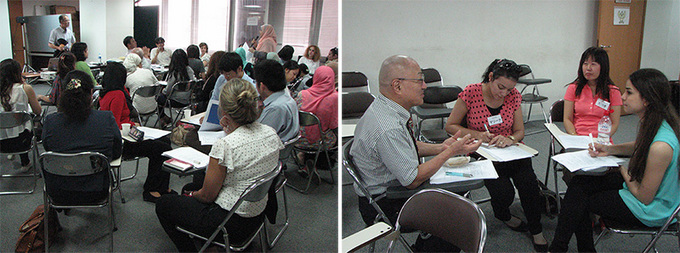
Left: Participants ask questions at the keynote speech delivered by Professor Miyazaki (Graduate School of Japanese Applied Linguistics, Waseda University)
Right: Group meeting
A revelation made by the Syrian teachers
A newspaper article published in December 2013 presented the situation at the Japanese Language Department of Damascus University after all five Japanese teachers left Syria because of the civil war. The article described the struggle of the remaining Syrian teachers to continue teaching classes, and the persistence of students who commuted for two hours, sometimes across battle zones, to attend classes. Another article published in April 2015 reported that the department stopped accepting new students because there were not enough teachers.
After the seminar and the get-together party ended, and the participants were leaving in groups of twos and threes, we were approached by the two Syrian teachers. They invited me, the director of the Japan Foundation Cairo Office, and the director of the Information and Culture Center at the Embassy of Japan in Egypt for a meeting in a separate room, at which they shared with us a deeply-disturbing development.
If Japanese teachers did not return, it was likely that the Japanese Language Department would not be able to accept new students next year either, and would be closed. In that case, since the university could not offer new positions to the two young teachers, there was a very strong probability that they would lose their jobs. I tried to come up with some good ideas, and various possibilities crossed my mind, such as distance learning, training, study abroad, and creation of a community of learners, but I could not formulate a single idea that would help them solve this problem, so I did not say anything.
Support for Japanese language education in Syria
I wanted to help, but I did not have a clear idea how. I discussed the issue with lecturers at the Japan Foundation Cairo Office, and one of them suggested to send books. Knowing that this would hardly solve the issue faced by the Syrian teachers, we made an appeal using social networking services and started collecting Japanese language educational materials. The luggage of the two teachers prior to returning to Syria was a couple of kilograms below the weight restrictions. Still, a couple of kilograms is not so much when it comes to books. Sure enough, we quickly collected about 20kg worth of books, and decided to send them by mail, at the expense of the Japan Foundation Cairo Office. The package arrived in Damascus in September, and the two teachers contacted us to say that they were on their way to pick up the books.
At the end of September, one of the teachers decided to apply for a graduate program provided by the Japan Foundation, and sent us her research plan by email. This plan reflected her pragmatic view of the situation in Syria and her determination to not let the quality of Japanese language education there decline even in the absence of Japanese teachers. I am convinced that as long as these two young teachers continue their work, even if the Japanese Language Department is dismantled, they can rebuild it. I want to do everything in my power to support them. They, and Syria as well, are worth our best effort.
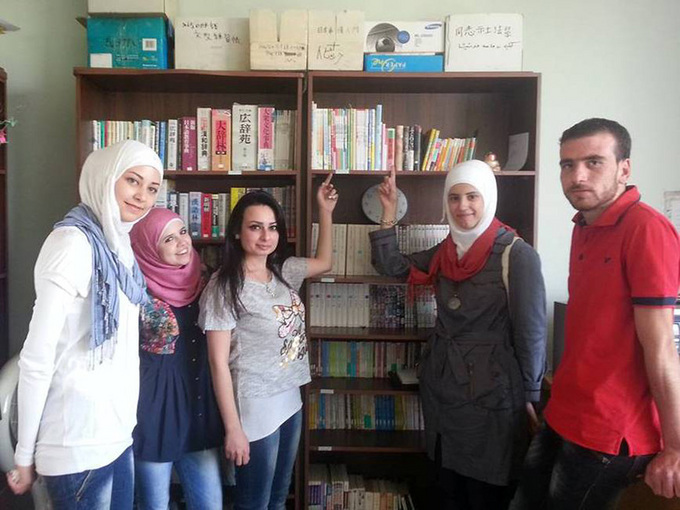
A photo sent by the Japanese Language Department of Damascus University as a token of their appreciation for the donation of Japanese language educational materials
Back Issues
- 2024.3. 4 Movie Theaters aroun…
- 2023.4.10 The 49th Japan Found…
- 2023.3.28 JF's Initiatives for…
- 2023.1.27 Living Together with…
- 2022.11.16 Inner Diversity <…
- 2022.6.21 The 48th Japan Found…
- 2022.3.22 JF's Initiatives for…
- 2022.3.14 JF's Initiatives for…
- 2022.2.14 JF's Initiatives for…
- 2022.2. 4 JF's Initiatives for…

